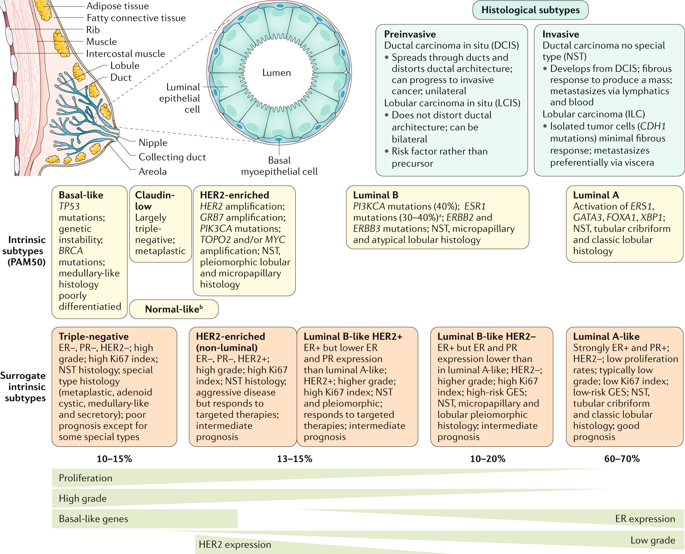当前位置:
X-MOL 学术
›
Nat. Rev. Dis. Primers
›
论文详情
Our official English website, www.x-mol.net, welcomes your
feedback! (Note: you will need to create a separate account there.)
Breast cancer.
Nature Reviews Disease Primers ( IF 76.9 ) Pub Date : 2019-09-23 , DOI: 10.1038/s41572-019-0111-2 Nadia Harbeck 1 , Frédérique Penault-Llorca 2 , Javier Cortes 3, 4 , Michael Gnant 5 , Nehmat Houssami 6 , Philip Poortmans 7, 8 , Kathryn Ruddy 9 , Janice Tsang 10 , Fatima Cardoso 11
Nature Reviews Disease Primers ( IF 76.9 ) Pub Date : 2019-09-23 , DOI: 10.1038/s41572-019-0111-2 Nadia Harbeck 1 , Frédérique Penault-Llorca 2 , Javier Cortes 3, 4 , Michael Gnant 5 , Nehmat Houssami 6 , Philip Poortmans 7, 8 , Kathryn Ruddy 9 , Janice Tsang 10 , Fatima Cardoso 11
Affiliation

|
Breast cancer is the most frequent malignancy in women worldwide and is curable in ~70-80% of patients with early-stage, non-metastatic disease. Advanced breast cancer with distant organ metastases is considered incurable with currently available therapies. On the molecular level, breast cancer is a heterogeneous disease; molecular features include activation of human epidermal growth factor receptor 2 (HER2, encoded by ERBB2), activation of hormone receptors (oestrogen receptor and progesterone receptor) and/or BRCA mutations. Treatment strategies differ according to molecular subtype. Management of breast cancer is multidisciplinary; it includes locoregional (surgery and radiation therapy) and systemic therapy approaches. Systemic therapies include endocrine therapy for hormone receptor-positive disease, chemotherapy, anti-HER2 therapy for HER2-positive disease, bone stabilizing agents, poly(ADP-ribose) polymerase inhibitors for BRCA mutation carriers and, quite recently, immunotherapy. Future therapeutic concepts in breast cancer aim at individualization of therapy as well as at treatment de-escalation and escalation based on tumour biology and early therapy response. Next to further treatment innovations, equal worldwide access to therapeutic advances remains the global challenge in breast cancer care for the future.
中文翻译:

乳腺癌。
乳腺癌是全世界女性中最常见的恶性肿瘤,约70-80%的患有早期非转移性疾病的患者可以治愈。具有远处器官转移的晚期乳腺癌被认为是目前可用的治疗方法无法治愈的。从分子水平上讲,乳腺癌是一种异质性疾病。分子特征包括人类表皮生长因子受体2(HER2,由ERBB2编码)的激活,激素受体(雌激素受体和孕激素受体)的激活和/或BRCA突变。治疗策略因分子亚型而异。乳腺癌的治疗是多学科的;它包括局部(手术和放射疗法)和全身疗法。全身疗法包括针对激素受体阳性疾病的内分泌疗法,化学疗法,抗HER2阳性疾病的抗HER2疗法,骨稳定剂,BRCA突变携带者的聚(ADP-核糖)聚合酶抑制剂,以及最近的免疫疗法。乳腺癌的未来治疗概念旨在个体化治疗以及基于肿瘤生物学和早期治疗反应的治疗降级和升级。除了进一步的治疗创新之外,全球范围内平等获得治疗进展仍然是未来乳腺癌护理的全球挑战。
更新日期:2019-09-23
中文翻译:

乳腺癌。
乳腺癌是全世界女性中最常见的恶性肿瘤,约70-80%的患有早期非转移性疾病的患者可以治愈。具有远处器官转移的晚期乳腺癌被认为是目前可用的治疗方法无法治愈的。从分子水平上讲,乳腺癌是一种异质性疾病。分子特征包括人类表皮生长因子受体2(HER2,由ERBB2编码)的激活,激素受体(雌激素受体和孕激素受体)的激活和/或BRCA突变。治疗策略因分子亚型而异。乳腺癌的治疗是多学科的;它包括局部(手术和放射疗法)和全身疗法。全身疗法包括针对激素受体阳性疾病的内分泌疗法,化学疗法,抗HER2阳性疾病的抗HER2疗法,骨稳定剂,BRCA突变携带者的聚(ADP-核糖)聚合酶抑制剂,以及最近的免疫疗法。乳腺癌的未来治疗概念旨在个体化治疗以及基于肿瘤生物学和早期治疗反应的治疗降级和升级。除了进一步的治疗创新之外,全球范围内平等获得治疗进展仍然是未来乳腺癌护理的全球挑战。































 京公网安备 11010802027423号
京公网安备 11010802027423号